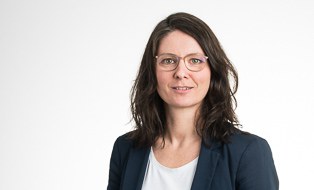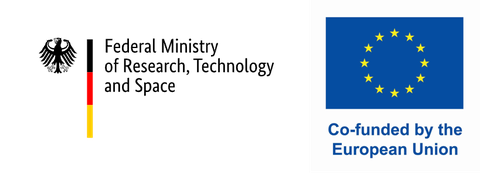ESF PLUS Directive for the funding of projects as part of the program "Sustainability at work - future-oriented training" (NIB) (Nachhaltig im Beruf – zukunftsorientiert ausbilden)
The Federal Ministry of Research, Technology and Space has published a second funding call for the funding guideline for the ESF Plus program "Sustainable at work - future-oriented training".
The background to this is the achievement of German and European climate targets and the associated fundamental changes in the economy and society. The term "transformation", which is often used in this context, refers not only to aspects of digital and demographic change, but above all to socio-ecological transformation in the sense of decarbonization, resource conservation and social justice. The associated guiding principle of sustainability, which also encompasses social and economic aspects, shows an increased need for action, particularly with regard to energy production/renewable energy sources, the circular economy, industrial value creation, mobility/transport, agriculture and building use. Vocational training with the instruments of skills development and qualification is a suitable and indispensable means of achieving this.
This funding guideline is aimed at the following two areas of socio-ecological transformation in the corporate context, particularly in SMEs:
- Energy transition:
A sustainable transformation requires the consumption of non-renewable energies to be reduced to zero by 2045. This can also create new value creation potential for Germany as a business and industrial location. In this context, it is a matter ofmore CO2-saving production, more efficient use and saving of energy, electricity and heat. - Circular economy:
For a sustainable transformation, economic growth should be decoupled from resource consumption. This means redesigning the value creation patterns on which production is based. For example, sustainable supply chains are now just as necessary as the careful use of resources by using products for as long as possible, recycling and repairing them and avoiding waste.
The purpose of the grant is to develop and test innovative, practice-oriented and transferable solutions for the vocational education and training (qualification) of specialist personnel in the context of the energy transition and the circular economy in accordance with the principles of sustainable development. This is based on specific problems in the companies. The focus is therefore not on individual sectors or professions, but on all stakeholders who are already involved in these two transformation areas.
Transformation projects
- Joint and individual projects (joint project consists of at least two partners)
- in the areas of energy transition and/or circular economy in companies, especially in SMEs, in cooperation with science
- Solutions, innovative measures and vocational education and training offers for managing and shaping the socio-ecological transformation are to be developed and initiated
- Focus: vocational qualification
ONE meta project
- Transformation projects are accompanied at an overarching level by development and design-oriented research
- Supporting the transfer of knowledge between the transformation projects
- Supporting the projects in the specific development of transferable products
- Generation of scientific findings
- Starts approx. 3-4 months after the transformation projects
Eligible applicants are
- legal entities under public law and
- legal entities and partnerships under private law,
Research institutions that receive basic funding from the Federal and/ or State governments can receive project funding for their additional project-related expenses in addition to their institutional funding if they explicitly describe the relationship between the project applied for and the basic-funded activities in the funding application or clearly distinguish between the two.
Universities, research and scientific institutions can only be applicants in collaborative projects in which non-scientific collaborative partners are also involved.
Funding is provided for projects that support the socio-ecological transformation in the areas of energy transition and/or circular economy in companies, particularly in SMEs.
- Transfer strategy: Concepts, measures and products are tested, disseminated and structurally anchored in suitable contexts. Further multipliers and transfer actors will be involved in the course of the project
- Subsequent use of the developments and access to the products for third parties: through open access, open standards, open source platforms or open educational resources through Creative Commons licenses
- Consideration of ESF cross-cutting issues, both in terms of content and in own processes: Gender equality, anti-discrimination, environmental sustainability
- Meaningful letters of intent
The grant is awarded as partial funding in the form of project funding.
Funding for transformation projects is scheduled to begin on September 1, 2025. The meta-project should begin four months later if possible, from January 1, 2026 at the earliest, and end with a corresponding time delay after the transformation projects. The funding period for transformation projects and the meta project is up to 36 months.
A third funding guideline is being planned.
The eligible expenditure and costs must amount to at least EUR 200,000 per individual project or consortium partner. Up to 100 % of the funding is provided on a pro rata basis. The total volume of the funding guideline is approximately EUR 13 million.
Expenditure and costs must be directly related to the funded project:
- Personnel expenses including funds for Research Assistants and Student Assistants
- Expenses for project-related business trips, accommodation in Germany for project staff for working meetings with collaborative partners or strategic partners or the meta project
- Participation of up to two people per partner in program-related workshops and nationwide events: EUR 700 per person
- Material expenses that go beyond the usual business requirements and are used exclusively for the creation of digital and analog teaching/learning media, qualifications, etc.
- The total amount of orders placed with third parties may not exceed the amount of the services provided by the organization itself. They are eligible for funding up to a maximum of 50% of the eligible personnel expenses
A project lump sum for the pro rata financing of indirect project expenditure is not granted.
The EPC supports TU Dresden projects in accordance with the Vice-Rector Research 2/2023 and must be involved in the application process. The EPC provides advice on the funding conditions and the application process, has powers of attorney for legally binding signatures and has central access to the easy-Online application portal for submitting project proposals.
The application procedure has a two-stage structure: In the first stage, a project outline must be submitted via easy-Online by February 15, 2025, which for TU Dresden is done via the EPC. After a positive expert assessment, the submission of a funding application is recommended.
Applicants must submit the following documents by e-mail to by February 10, 2025 at the latest:
- Project outline: maximum 15 A4 pages for collaborative projects or maximum twelve A4 pages for individual projects; Arial font, font size 11 point, line spacing of at least 1.15 lines and margins of at least two centimeters; mandatory attachment work and time planning
- Calculation of project costs (personnel costs: we will be happy to calculate the personnel costs if you contact us before February 10, 2025)
- Notification of third-party funding
The following applies to the project outline for collaborative projects
- a joint project description with the partners' contributions based on a division of labor
- Joint exploitation plan for the results
- work planning, from which the respective responsibilities are derived
- separate application: the amount of funding may vary
- Program page of the Federal Institute for Vocational Education and Training
- Funding guideline
- Work plan and timetable
- Project outline (in folder)
- FAQ on the program/guideline
- Info event presentation BiBB
- Info event presentation BMBF
- Information event Presentation KBS
- Communication from the Vice-Rector Research 2/2023
- Notification of third-party funding
- TUD-EPC Privacy Policy
Contact at EPC:
 © TU Dresden
© TU Dresden
Deputy Head of Unit / Project Manager
NameMs Susan Kasten
ESF Plus, Federal ESF Plus, ERDF/JTF
Send encrypted email via the SecureMail portal (for TUD external users only).
Visiting address:
FAL Falkenbrunnen BT-A Würzburger Straße 35
01187 Dresden

